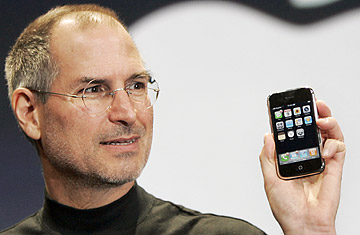
Apple CEO Steve Jobs demonstrates the new iPhone.
It's one thing to get your hands on an iPhone, as folks camped out in front of Apple stores around the country will do by the weekend. But there's no choice about the carrier: you only get AT&T (formerly Cingular) on an iPhone. And so far, the early reviews have not been kind to the mobile service and especially its cellular data network ("Pokey," says the Wall Street Journal; "excruciatingly slow," says the New York Times. A spokesman for AT&T said the company disagreed with those characterizations). Before the reviews emerged, AT&T tried to play down the speed issue and play up the new experience provided by Apple's so-far well-received iPhone software. "It's not just the speed of the uplink," says Carlton Hill, an AT&T Vice-President. "It's about the processor speed on a device and the application design that enhance the customer experience. There are a lot of ways to have an optimized data experience." And the iPhone's web capacities are said to improve dramatically when it can sync up with local Wi-Fi networks — if so, it would be a juxtaposition that may make the AT&T connection feel even slower.
Nevertheless, analysts expect that millions of consumers will eventually switch away from their current carrier to buy into Apple's offering — and that says a lot about how frustrated people are with the wireless carriers. Forrester Research has found that the percentage of consumers who are happy with their carrier has fallen steadily year after year, and more than 80% of those surveyed by Measuredup.com, a customer service rating site, aren't satisfied with their carrier's service. Measuredup.com founder Marc Karasu says consumers are tired of carriers burning through hundreds of millions on ads while ignoring major service problems. "Customers are screaming for better service," he says, "and if it doesn't come from the carriers, it will come from someone else."
Here's a look at what frustrates consumers most (some solved on the iPhone, others not):
ONE: VOICE MAIL
Consumers are tired of wading through eight messages to hear the one they need (an inconvenience the iPhone is said to solve). And they are frustrated that carriers erase old messages and tightly cap your inbox. With data storage costs dropping, why can't you keep your messages, or download them to your computer? Imagine if Yahoo! let you keep just 30 or 40 email messages at a time. (Instead they offer unlimited, free email storage). "People treat voice mail like toxic waste," says Craig Walker, CEO and founder of GrandCentral, a startup that offers unlimited voice-mail storage. "They feel like they have to delete every single message. But what if they want to save something?" says Walker. "I have 10,000 emails in my inbox, which is incredibly valuable. I can go back and find an old message. People should be able to do the same thing with voice mail." Consumers have long been able to save e-mails, forward them at will and access them in whatever order
they want, so why is voice-mail stuck in the dark ages? The carriers haven't improved voice-mail because it's harder to market service features than, say, sexy phones that work exclusively on one network.
TWO: FEE CREEP
After shelling out $40 or $50 a month for a basic calling plan, carriers pinch consumers for additional bucks over and over again. Starting with an activation fee and ending with a cancellation fee if you decide to switch carriers or want to cancel your service, consumers are squeezed for dozens of add-on charges. For ring tones, video services, text messages, and just about any specialty service that comes along to provide a convenience, dollars are
tacked on to your bill. Apple and AT&T are taking a step away from that fee-squeezing model by offering all-in packages that include data, video and text messaging. They start at $60 a month, though, and climb to $100 for 1,350 monthly minutes of calling. That means that if you get the $600 model and choose the top minutes package, you're going to shell out more than $3000 over the course of the required two-year contract. Oh, and you'll still have to
pay $36 for activation.
